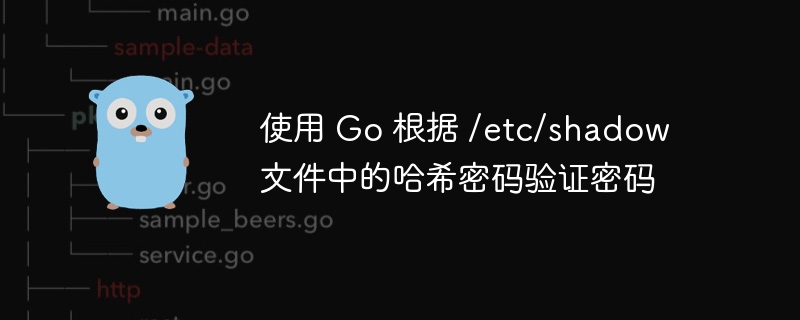 Backend-Entwicklung
Backend-Entwicklung
 Golang
Golang
 Verwenden Sie Go, um Passwörter basierend auf gehashten Passwörtern in der Datei /etc/shadow zu überprüfen
Verwenden Sie Go, um Passwörter basierend auf gehashten Passwörtern in der Datei /etc/shadow zu überprüfen
Verwenden Sie Go, um Passwörter basierend auf gehashten Passwörtern in der Datei /etc/shadow zu überprüfen

php小编子墨今天为大家介绍一种使用Go语言验证密码的方法,这个方法是基于读取/etc/shadow文件中的哈希密码进行验证的。在日常开发中,密码验证是一个非常重要的功能,而使用Go语言可以快速、高效地实现密码验证的功能。通过读取/etc/shadow文件中的哈希密码并进行比对,我们可以确保用户输入的密码与存储在系统中的密码一致。本文将详细介绍这个方法的实现过程,希望能对大家有所帮助。
问题内容
我目前在 /etc/shadow 文件中的密码格式类似于 $6$icnb6xpt8xjwc$ai9rq5hqpep.juts/tubhk/oi7so/s1aa.ihgbjhn12qmt5p44x5or86pso9/opbo4cmo0at4xumc0ycapo8 7/(sha512加密密码)。我需要做的是验证密码(用户提供的密码和当前的哈希密码)。我正在 go 上实现这个。
我试图实现这一目标的方法是,获取用户提供的密码,使用与 /etc/shadow 中相同的盐对其进行哈希处理,并检查它们是否相似或不同。如何生成相同的哈希值并验证密码?
下面是我正在做的粗略代码(根据 amadan 对编码的评论进行了更新)
// this is what is stored on /etc/shadow - a hashed string of "test"
myPwd := "$6$IcnB6XpT8xjWC$AI9Rq5hqpEP.Juts/TUbHk/OI7sO/S1AA.ihgBjHN12QmT5p44X5or86PsO9/oPBO4cmo0At4XuMC0yCApo87/"
// getting the salt
salt := strings.Split(myPwd, "$")[2]
encoding := base64.NewEncoding("./0123456789ABCDEFGHIJKLMNOPQRSTUVWXYZabcdefghijklmnopqrstuvwxyz").WithPadding(base64.NoPadding)
decodedSalt, err := encoding.DecodeString(salt)
// user provided password
myNewPwd := "test"
newHashedPwd, err := hashPwd512(string(myNewPwd), string(decodedSalt))
// comparision
if (newHashedPwd == myPwd) {
// password is same, validate it
}
// What I'm expecting from this method is that for the same password stored in the /etc/shadow,
// and the same salt, it should return (like the one in /etc/shadow file)
// AI9Rq5hqpEP.Juts/TUbHk/OI7sO/S1AA.ihgBjHN12QmT5p44X5or86PsO9/oPBO4cmo0At4XuMC0yCApo87/
func hashPwd512(pwd string, salt string) (string, error) {
hash := sha512.New()
hash.Write([]byte(salt))
hash.Write([]byte(pwd))
encoding := base64.NewEncoding("./0123456789ABCDEFGHIJKLMNOPQRSTUVWXYZabcdefghijklmnopqrstuvwxyz").WithPadding(base64.NoPadding)
hashedPwd := encoding.EncodeToString(hash.Sum(nil))
return hashedPwd, nil
}注意:密码通过passwd或chpasswd设置/更改。
解决方法
sha512 是一种快速哈希。这对密码来说是不利的,因为当每次尝试几乎不需要花费任何成本时,暴力破解就变得非常容易。为了减慢速度,/etc/shadow 中的内容不仅仅是一个简单的 sha512 哈希值,而是 key拉伸适用于哈希算法运行数千次的情况。具体的密钥拉伸算法好像是这个。因此,crypto/sha512 只完成了所需任务的大约 1/5000(默认情况下)。
package main
import (
"fmt"
"strings"
"github.com/gehirninc/crypt"
_ "github.com/gehirninc/crypt/sha512_crypt"
)
func main() {
saltedpass := "$6$icnb6xpt8xjwc$ai9rq5hqpep.juts/tubhk/oi7so/s1aa.ihgbjhn12qmt5p44x5or86pso9/opbo4cmo0at4xumc0ycapo87/"
fmt.println("original: ", saltedpass)
// make new hash from scratch
plainpass := "test"
crypt := crypt.sha512.new()
newsaltedpass, err := crypt.generate([]byte(plainpass), []byte(saltedpass))
if err != nil {
panic(err)
}
fmt.println("generated:", newsaltedpass)
// verify a password (correct)
err = crypt.verify(saltedpass, []byte(plainpass))
fmt.println("verification error (correct password): ", err)
// verify a password (incorrect)
badpass := "fail"
err = crypt.verify(saltedpass, []byte(badpass))
fmt.println("verification error (incorrect password):", err)
}由于您只需要验证,因此 verify 快捷方式就足够了(它会在幕后为您生成 generate):
err = crypt.verify(saltedpass, []byte(plainpass))
if err == nil {
fmt.println("fly, you fools!")
} else {
fmt.println("you shall not pass!")
}输出:
Original: $6$IcnB6XpT8xjWC$AI9Rq5hqpEP.Juts/TUbHk/OI7sO/S1AA.ihgBjHN12QmT5p44X5or86PsO9/oPBO4cmo0At4XuMC0yCApo87/ Generated: $6$IcnB6XpT8xjWC$AI9Rq5hqpEP.Juts/TUbHk/OI7sO/S1AA.ihgBjHN12QmT5p44X5or86PsO9/oPBO4cmo0At4XuMC0yCApo87/ Verification error (correct password): <nil> Verification error (incorrect password): hashed value is not the hash of the given password
注意:我相信我的评论是错误的。密码哈希本身就是通过这种编码进行编码的,但盐似乎是真正的盐(只是当它随机生成时,使用了该编码中的字符)。
该库还支持其他哈希函数,但您确实需要为每个函数进行导入才能注册它。您还可以看到,我没有费心从 saltedpass 中分离盐;这也是您不需要担心的事情。
但是,如果您出于某种原因确实想隔离盐,那么还要注意,从一开始就计算 $ 并不是一个安全的想法,因为它将无法处理像 $6$rounds=77777$ 这样的条目例如,正确地短 $wuqyw2yr.hbnpjjrhpyd/ifiw05xdfeeyqomxixbkvr0g 。使用 strings.lastindex(saltedpass, "$") + 1 作为切入点。
Das obige ist der detaillierte Inhalt vonVerwenden Sie Go, um Passwörter basierend auf gehashten Passwörtern in der Datei /etc/shadow zu überprüfen. Für weitere Informationen folgen Sie bitte anderen verwandten Artikeln auf der PHP chinesischen Website!

Heiße KI -Werkzeuge

Undresser.AI Undress
KI-gestützte App zum Erstellen realistischer Aktfotos

AI Clothes Remover
Online-KI-Tool zum Entfernen von Kleidung aus Fotos.

Undress AI Tool
Ausziehbilder kostenlos

Clothoff.io
KI-Kleiderentferner

AI Hentai Generator
Erstellen Sie kostenlos Ai Hentai.

Heißer Artikel

Heiße Werkzeuge

Notepad++7.3.1
Einfach zu bedienender und kostenloser Code-Editor

SublimeText3 chinesische Version
Chinesische Version, sehr einfach zu bedienen

Senden Sie Studio 13.0.1
Leistungsstarke integrierte PHP-Entwicklungsumgebung

Dreamweaver CS6
Visuelle Webentwicklungstools

SublimeText3 Mac-Version
Codebearbeitungssoftware auf Gottesniveau (SublimeText3)

Heiße Themen
 Welche Bibliotheken werden für die Operationen der schwimmenden Punktzahl in Go verwendet?
Apr 02, 2025 pm 02:06 PM
Welche Bibliotheken werden für die Operationen der schwimmenden Punktzahl in Go verwendet?
Apr 02, 2025 pm 02:06 PM
In der Bibliothek, die für den Betrieb der Schwimmpunktnummer in der GO-Sprache verwendet wird, wird die Genauigkeit sichergestellt, wie die Genauigkeit ...
 Was ist das Problem mit Warteschlangen -Thread in Go's Crawler Colly?
Apr 02, 2025 pm 02:09 PM
Was ist das Problem mit Warteschlangen -Thread in Go's Crawler Colly?
Apr 02, 2025 pm 02:09 PM
Das Problem der Warteschlange Threading In Go Crawler Colly untersucht das Problem der Verwendung der Colly Crawler Library in Go -Sprache. Entwickler stoßen häufig auf Probleme mit Threads und Anfordern von Warteschlangen. � ...
 Wie kann ich das Problem lösen, das benutzerdefinierte Strukturbezeichnungen in Goland nicht wirksam werden?
Apr 02, 2025 pm 12:51 PM
Wie kann ich das Problem lösen, das benutzerdefinierte Strukturbezeichnungen in Goland nicht wirksam werden?
Apr 02, 2025 pm 12:51 PM
In Bezug auf das Problem der benutzerdefinierten Struktur -Tags in Goland bei der Verwendung von Goland für GO -Sprachentwicklung stoßen Sie häufig auf einige Konfigurationsprobleme. Einer von ihnen ist ...
 Welche Bibliotheken in GO werden von großen Unternehmen entwickelt oder von bekannten Open-Source-Projekten bereitgestellt?
Apr 02, 2025 pm 04:12 PM
Welche Bibliotheken in GO werden von großen Unternehmen entwickelt oder von bekannten Open-Source-Projekten bereitgestellt?
Apr 02, 2025 pm 04:12 PM
Welche Bibliotheken in GO werden von großen Unternehmen oder bekannten Open-Source-Projekten entwickelt? Bei der Programmierung in Go begegnen Entwickler häufig auf einige häufige Bedürfnisse, ...
 Warum hat das Drucken von Saiten mit Println und String () -Funktionen unterschiedliche Effekte?
Apr 02, 2025 pm 02:03 PM
Warum hat das Drucken von Saiten mit Println und String () -Funktionen unterschiedliche Effekte?
Apr 02, 2025 pm 02:03 PM
Der Unterschied zwischen Stringdruck in GO -Sprache: Der Unterschied in der Wirkung der Verwendung von Println und String () ist in Go ...
 Go Sprache ist ineffizient bei der Verarbeitung massiver URL -Zugriffs, wie Sie ihn optimieren können?
Apr 02, 2025 am 10:15 AM
Go Sprache ist ineffizient bei der Verarbeitung massiver URL -Zugriffs, wie Sie ihn optimieren können?
Apr 02, 2025 am 10:15 AM
Leistungsoptimierungsstrategie für GO Language Massive URL -Zugriff In diesem Artikel wird eine Leistungsoptimierungslösung für das Problem der Verwendung von GO -Sprache vorgeschlagen, um den massiven URL -Zugriff zu verarbeiten. Bestehende Programme von CSV ...
 Bytes.Buffer in Go -Sprache verursacht Speicherleck: Wie schließt der Client den Antwortkörper korrekt, um die Speicherverwendung zu vermeiden?
Apr 02, 2025 pm 02:27 PM
Bytes.Buffer in Go -Sprache verursacht Speicherleck: Wie schließt der Client den Antwortkörper korrekt, um die Speicherverwendung zu vermeiden?
Apr 02, 2025 pm 02:27 PM
Analyse von Speicherlecks, die durch Bytes verursacht werden.
 Warum ist es notwendig, Zeiger zu verabschieden, wenn sie GO- und Viper -Bibliotheken verwenden?
Apr 02, 2025 pm 04:00 PM
Warum ist es notwendig, Zeiger zu verabschieden, wenn sie GO- und Viper -Bibliotheken verwenden?
Apr 02, 2025 pm 04:00 PM
Go Zeigersyntax und Probleme bei der Verwendung der Viper -Bibliothek bei der Programmierung in Go -Sprache. Es ist entscheidend, die Syntax und Verwendung von Zeigern zu verstehen, insbesondere in ...





